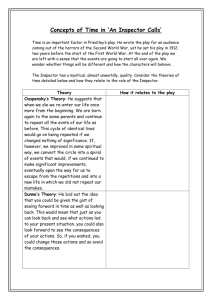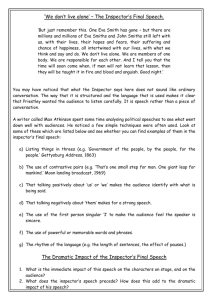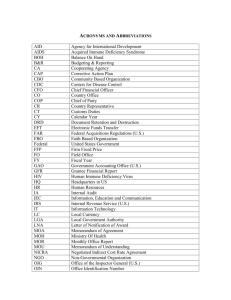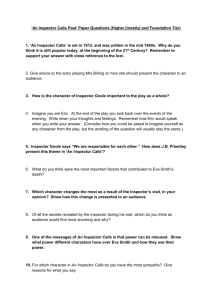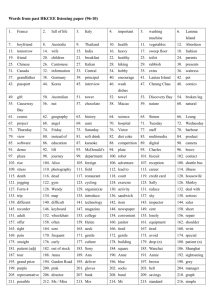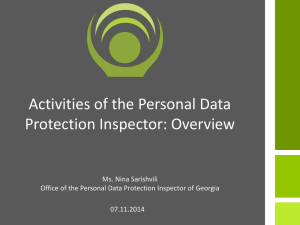When an inspector calls
advertisement
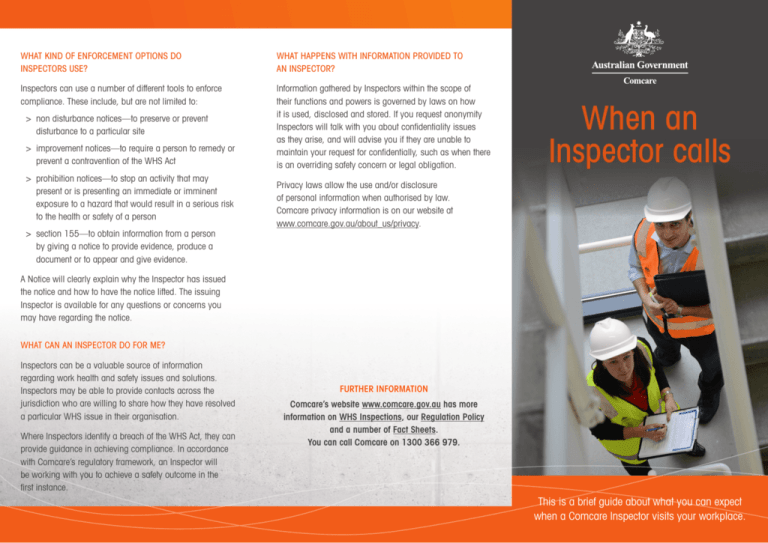
WHAT KIND OF ENFORCEMENT OPTIONS DO INSPECTORS USE? WHAT HAPPENS WITH INFORMATION PROVIDED TO AN INSPECTOR? Inspectors can use a number of different tools to enforce compliance. These include, but are not limited to: Information gathered by Inspectors within the scope of their functions and powers is governed by laws on how it is used, disclosed and stored. If you request anonymity Inspectors will talk with you about confidentiality issues as they arise, and will advise you if they are unable to maintain your request for confidentially, such as when there is an overriding safety concern or legal obligation. >> non disturbance notices—to preserve or prevent disturbance to a particular site >> improvement notices—to require a person to remedy or prevent a contravention of the WHS Act >> prohibition notices—to stop an activity that may present or is presenting an immediate or imminent exposure to a hazard that would result in a serious risk to the health or safety of a person >> section 155—to obtain information from a person by giving a notice to provide evidence, produce a document or to appear and give evidence. When an Inspector calls Privacy laws allow the use and/or disclosure of personal information when authorised by law. Comcare privacy information is on our website at www.comcare.gov.au/about_us/privacy. A Notice will clearly explain why the Inspector has issued the notice and how to have the notice lifted. The issuing Inspector is available for any questions or concerns you may have regarding the notice. WHAT CAN AN INSPECTOR DO FOR ME? Inspectors can be a valuable source of information regarding work health and safety issues and solutions. Inspectors may be able to provide contacts across the jurisdiction who are willing to share how they have resolved a particular WHS issue in their organisation. Where Inspectors identify a breach of the WHS Act, they can provide guidance in achieving compliance. In accordance with Comcare’s regulatory framework, an Inspector will be working with you to achieve a safety outcome in the first instance. FURTHER INFORMATION Comcare’s website www.comcare.gov.au has more information on WHS Inspections, our Regulation Policy and a number of Fact Sheets. You can call Comcare on 1300 366 979. This is a brief guide about what you can expect when a Comcare Inspector visits your workplace. HOW TO IDENTIFY A COMCARE INSPECTOR Comcare Inspectors will introduce themselves to you as an Inspector when carrying out their duties. They have identification with them at all times and will provide it for viewing upon request. WHAT SHOULD I EXPECT WHEN AN INSPECTOR VISITS MY WORKPLACE? When an Inspector visits your workplace, they will advise you of the purpose of their visit. Most inspections have been pre-arranged and the reasons explained. Inspectors may want to: >> tour the workplace >> speak to workers and/or key managers >> speak to health and safety representatives (HSRs) or union representatives WHAT SHOULD I EXPECT IF AN INSPECTOR ASKS TO INTERVIEW ME? Unless the Inspector advises otherwise, you are not compelled to speak with an Inspector or answer their questions. Inspectors may record interviews by taking notes, taking a typed statement, or using an audio or video recorder. Where an Inspector is exercising their powers, they will provide you with a copy of the recording within seven days of the interview. If the Inspector decides to use their powers, they will advise you of your legal rights and obligations under the Work Health and Safety Act 2011 (WHS Act). Inspectors must show you their Inspector ID card and advise you of the specific sections of the WHS Act they are exercising. One power an Inspector can use is to compel you to answer the Inspector’s questions. The Inspector must advise you that: >> review your risk register, asbestos register or other health and safety documentation >> it is not a reasonable excuse to refuse to answer on the grounds of self-incrimination >> speak to you about identified hazards and the controls you have in place to minimise risk. >> failure to provide an answer to their question constitutes an offence under the WHS Act WHAT KIND OF POWERS DO INSPECTORS HAVE? Inspectors have a variety of powers available to them under the WHS Act. These include but are not limited to the power to: >> enter a workplace >> require you to provide documents and/or information >> require you to answer their questions, even where the answers may incriminate you (however not when they may compromise legal professional privilege) >> you do not have to disclose information or documents subject to legal professional privilege >> seize evidence and/or documents >> the information you provide cannot be used against you in criminal or civil proceedings as an individual. >> issue notices. >> take statements Inspectors have a number of conditions placed on them to ensure their powers are being used appropriately. If you have any concerns regarding the Inspector using their powers, speak with the Inspector or ask them for the contact details of their team leader.
